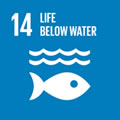Por favor, use este identificador para citar o enlazar a este item:
http://hdl.handle.net/10261/338917COMPARTIR / EXPORTAR:
 SHARE SHARE
 CORE
BASE CORE
BASE
|
|
| Visualizar otros formatos: MARC | Dublin Core | RDF | ORE | MODS | METS | DIDL | DATACITE | |

| Título: | Identifying and prioritizing demersal fisheries restricted areas based on combined ecological and fisheries criteria: The western Mediterranean |
Autor: | Ortega Cerdà, Miquel CSIC ORCID CVN ; Castro Cadenas, María Dolores; Steenbeek, Jeroen CSIC ORCID; Coll, Marta CSIC ORCID | Palabras clave: | Fisheries Restricted Areas EFH VME Nature-based Solutions Fisheries management Mediterranean Sea |
Fecha de publicación: | nov-2023 | Editor: | Elsevier | Citación: | Marine Policy 157: 105850 (2023) | Resumen: | The western Mediterranean basin is a high marine biodiversity area under severe pressure by changing climate and intense human activities. Beyond national jurisdictions, international institutions such as the General Fisheries Commission for the Mediterranean (GFCM) work towards canalizing a regional consensus that fishing practices should evolve to better support the 2030 Agenda for Sustainable Development. In this context, Fisheries Restricted Areas (FRA) are proposed as effective management measures to contribute towards increasing fisheries sustainability in the region that can be considered, under some conditions, as Nature-based Solutions (NbS); however, how to operationalize their framework remains unclear. In this study, based on combined ecological and fisheries criteria, we identify and prioritize six potential priority areas for management (PAMs) in the western Mediterranean Sea. They are specifically aimed at the protection and recovery of Essential Fish Habitats and the conservation of Vulnerable Marine Ecosystems, whilst requiring limited adaptation of fisheries practices due to their relative low fishing pressure. We compare the identified areas to those that are currently under protection, and to areas that have been proposed for protection at the GFCM. Our results show that the FRAs and other spatial management measures introduced in the last years marginally contribute to the protection PAMs in the western Mediterranean region. However, the adoption of FRAs that are currently under discussion at the GFCM could contribute significantly to improve the situation. FRAs could also contribute to operationalize NbS in the western Mediterranean Sea when properly designed and implemented | Descripción: | 11 pages, 7 figures, 3 tables, supplementary material https://doi.org/10.1016/j.marpol.2023.105850.-- Data Availability: Data will be made available on request | Versión del editor: | https://doi.org/10.1016/j.marpol.2023.105850 | URI: | http://hdl.handle.net/10261/338917 | DOI: | 10.1016/j.marpol.2023.105850 | ISSN: | 0308-597X | E-ISSN: | 0308-597X |
| Aparece en las colecciones: | (ICM) Artículos |
Ficheros en este ítem:
| Fichero | Descripción | Tamaño | Formato | |
|---|---|---|---|---|
| Ortega_et_al_2023.pdf | 7,27 MB | Adobe PDF |  Visualizar/Abrir | |
| Ortega_et_al_2023_suppl.pdf | 1,38 MB | Adobe PDF |  Visualizar/Abrir |
CORE Recommender
Page view(s)
43
checked on 03-may-2024
Download(s)
104
checked on 03-may-2024
Google ScholarTM
Check
Altmetric
Altmetric
Este item está licenciado bajo una Licencia Creative Commons



